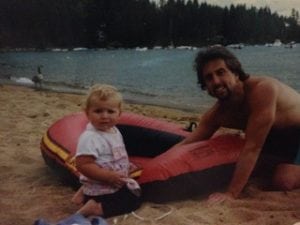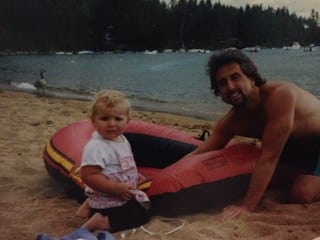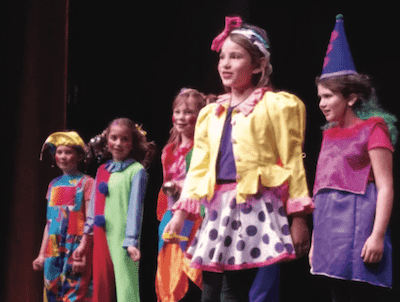Amnesty Hour
By Chris Jackson

As a parent, you’re like a spy. You need to gather intel on your kids. With good intel, you can make the right adjustments to keep them safe. The best way to get this intel is to get it right from them during what I call, “Amnesty Hour.”
During Amnesty Hour, your kids can confess anything without fear of punishment. More importantly, they can tell you anything without fear of being lectured or seeing you disappointed in them. You see, one of the main reasons kids keep the truth from us is that they treasure our love and approval. They don’t want to lose it. They want to please us, and they want us to be pleased with them.
I developed amnesty hour when my kids were preteens, but you can start amnesty hour with kids much younger than that. there is no age minimum. There is however, one important requirement of Amnesty Hour that must never be ignored: it must always be done with one child at a time (this frees up the child to share more freely). For this same reason, I prefer one parent with one child (I did it this way because I was a single parent). If yours is a two parent household, both parents must be mentally prepared to follow through with the conditions of Amnesty Hour: after a child shares, a parent will not punish, lecture or show disappointment.
For your first Amnesty Hour, simply ask your kids to choose a time to meet with you that works for both you. Give them a few days and times that stretch over a few weeks. You don’t need to mention the term Amnesty Hour or explain the plan for the hour yet. Remind them when it gets close to the day. If they try to reschedule, allow it, and once again give them several choices of days and times. When the time finally comes, it’s important for you to make sure there are no serious anxieties and problems that day that might present a need for the appointment to be rescheduled. Parents and kids should feel at ease for Amnesty Hour.
Once the hour starts, simply say to your child, “I’d like you to feel like you can tell me anything and be completely honest with me, so I’m giving you an Amnesty Hour today. During the next 60 minutes, anything you tell me will not result in you being punished. You won’t be yelled at, and I won’t be disappointed in you or give you lectures. Anything you share will be kept between us. I’m going to go first.” At that point, you confess something you hid from your parents. You explain why you hid the truth from your parents, and why you regret it now. Most likely, your kids will not trust that you will follow through with not punishing them, not being disappointed in them, and not lecturing them, so they will say they have nothing to share or confess. In that case, tell your child you will share one more confession about something you hid from your parents. By sharing your own confession, you model how to do it. It can be awkward and embarrassing, but when your child sees and hears you do it, she will be more likely to share with you.
After your additional share, remind your child of the awesome opportunity she has, and that the deal is only good for 51 minutes more (or whatever time is left in the hour). Tell your child that after the hour ends, anything you discover may come with a punishment. She will probably still not trust you to keep the amnesty hour terms, and she will most likely say she has nothing to share. That’s typical. At that point, just end the Amnesty Hour prematurely, and thank your child for listening and keeping her word about meeting with you. Tell her you’ll check in with her in a few weeks to schedule another one (it could be a few months later).
Please note that after an amnesty hour, it’s important that you keep any plans with your child later that day. If you’re supposed to go to the movies, go out for ice cream, or go play tennis, do it, and do it without showing anger, moodiness or disappointment.
For the next Amnesty Hour, it’s best to come with facts surrounding a lie told by the child. I knew my son lied about eating my leftovers (which were marked with my name), so I used that in my second amnesty hour with him. First, I shared with him my regret for the times I lied or kept something from my parents (his grandparents). Then, I calmly gave him an example of something he could share with me during the hour: he could confess that he lied about eating my leftovers. If he declined to share, I would remind him that if I discovered he was the guilty party, the only way for him to avoid punishment–for example, temporarily losing privileges with electronics–would be to confess the truth before the end of the hour. When he continued to decline, I simply shared another of my confessions about something I hid from my parents (or from someone else). With one minute left in the hour, I asked if he wanted to try sharing something before time ran out. he quickly said, “It was me. I ate your leftovers and lied about it. I was hungry.” I listened, stayed silent while nodding my head, thanked him, and declared that amnesty hour was over. I told him I’d keep my end of the agreement: there was no punishment or lecture. We went out to play basketball, and he never heard about it again. This laid the groundwork for his confessions during future amnesty hours because he knew he could trust me.
As for my daughter, I once presented her with an opportunity to confess that she’d lied about brushing her teeth a few nights prior. I saw that her toothbrush was dry, so I knew she wasn’t telling the truth. another time, I presented her with the opportunity to share that she lied about spilling pasta sauce on the floor. It’s important to always start with small offenses that they know would result in small punishments if you, her parent, were to not keep your part of the Amnesty Hour terms. In your child’s mind, the first confession will be a risk, and she will only try it with the truth surrounding a small offense.
You may be thinking, “Why should my kids get no punishment? What good does any of this do?” Remember, you are looking for serious, lifesaving intel. for example, one day (it could be years later), you may ask your teen to admit she snuck out at night and drove your car with friends partying in the backseat. When your child confesses to something like that, while you will not be punishing or lecturing, you’ll have an opportunity to make “adjustments” to your arrangement with your child. For example, the next time your child asks for the car keys, you hand her the keys to the two-seater, rather than the four- seat sedan, so she can’t have multiple friends in the car. additionally, you may start writing down mileage.
During Amnesty Hours, I’ve learned the names of those who present a danger to my kids (though my kids didn’t see the danger). When you gain information like this, you can act on it in somewhat of a covert way (remember, you’re a spy). For example, if the danger is from one of the popular kids at school, introduce yourself to the kid, and start up some small talk. You can mention how you noticed he’s really good with a basketball. Mention who your son is, and that as you’re around most days to pick him up from school, you’d like it if the kid could show you some of those basketball tricks. This may surprise you, but troublemaker kids don’t want parents who want to be their friend hanging around. their way out? They stop hanging out with your kid. now you don’t have ask your kid to stop hanging out with the troublemaker (which won’t work anyway).
I remember one particular amnesty hour where I learned the name of a troublemaker most of us would never suspect: a neighborhood parent who was supplying alcohol to kids, including my son. After I showed an unusual amount of interest in become this parent’s new buddy, my son stopped getting invited to his home. Imagine that.
Amnesty Hour makes it easy to be a “spy” parent. Try it. You’ll gain invaluable intel about your child’s feelings, actions, friends, and unhealthy coping mechanisms. You be better able to help your child, and you’ll grow closer together. Best of all, you need not have the spy skills of 007, just a free hour every few months.
Chris Jackson is the afternoon drive DJ at KFOX radio and is working on a book about raising your kids like rock stars.









One Comment
Bob Ray
Simply one fabulous idea, Chris! You rock – both on the radio and in real life. This is a great read and an incredibly sound idea. Great work from a great parent!
Good job doesn’t cover it but it’s the best I’ve got here on short notice …